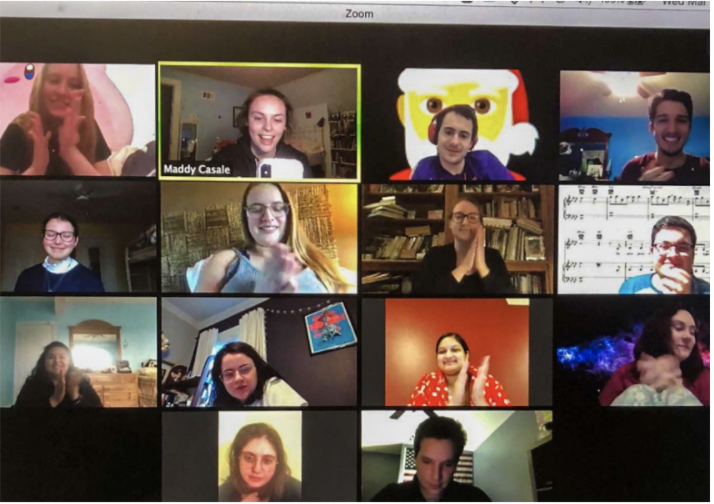Student Clubs and Organizations Responds to Distance Learning
COURTESY OF MADDY CASALE
Stove’s Comedy Club at Lincoln Center is one of the student organizations that has transitioned to online meetings.
April 1, 2020
For the Fordham community, the week of March 9, 2020, was marked by an all-consuming uncertainty followed by a period of rapid movement as all in-person classes were canceled and residential halls closed.
All Fordham clubs and organizations were forced to suspend in-person meetings and either cancel or rework events planned months in advance. With little to no time to adjust to the switch to online communication, some clubs are trying to maintain a sense of normalcy and continue regular operations while others pivoted in a completely different direction.
On March 23, Christina Frankovic, associate director of Student Involvement at Fordham Lincoln Center (FLC), sent out an email to students with an overview of virtual activities and events occurring at the university.
The 2020 Undergraduate Appreciation Awards (UNDYs), where students nominate each other or clubs and organizations for awards, as well as Fordham’s Got Talent, Campus Activities Board (CAB)’s annual talent show, will now take place virtually, Frankovic confirmed. Students are encouraged to submit video clips of their talent prior to the April 17 deadline.
Faith Nix, Fordham College at Lincoln Center (FCLC) ’22 and president of CAB, explained that CAB will continue to host weekly meetings via Zoom to discuss activities and events for the semester, including a possible online bingo night. Although the change to online has posed its issues, Nix is optimistic about the future.
“We see this change as an opportunity to get creative with how we engage with the Fordham community on a virtual level,” she said. “The online switch provides more accessibility to our events for some students: commuters don’t have to stay on campus for an event that runs late into the night when they have a long commute home afterwards.”
The Humanitarian Student Union (HSU) will not continue to hold meetings, but has a plan to keep members of the union and the Fordham community advocating for human rights and social justice. The union is working to create a digital version of their letter-writing campaign for women and girls who are asylum seekers and refugees.
HSU is also working with the Office of Student Involvement to expand this initiative and hopes to see an increase in students writing letters to their representatives as the university settles into working remotely.
Student publications have also been affected by the COVID-19 outbreak and subsequent university closings. While The Observer will continue to host weekly meetings via Zoom, FCLC’s literary magazine The Comma will not continue to do so. After some discussion between the executive and editorial boards, the club has decided to digitize an extended version of the spring 2020 publication.
Bessie Rubinstein, FCLC ’20 and editor-in-chief of The Comma, believes that continuing to feature and share creative work created by Fordham students during these tumultuous times is crucial.
“People need something, now — people need a way to get through the days without necessarily knowing what’s to come. What the students in The Comma have always found to be true is that art gives us purpose,” she said.
“Whether you create art to find your purpose, or you find happiness in identifying with art, we want to provide the Fordham community with both somewhere to place their work and somewhere to see work that brings a measure of joy,” Rubinstein continued.
Flash Magazine, FLC’s publication for fashion, beauty and New York City culture, will not proceed with meetings and does not plan to release a publication for the spring semester. Since production of content for the magazine relies predominantly on in-person collaboration, and the editors are currently dispersed across the globe, all shoots have been postponed.
Although Nishita Naga, Gabelli School of Business ’21 and editor-in-chief of the magazine, agrees that there are ways to shift activities online, the unique multimedia nature of Flash impedes their ability to continue effectively.
“When the face of the magazine has changed so much, we want to keep some consistency for the next few issues at least, and without a digital platform, that unfortunately means waiting until we can conduct business as usual,” she said. “I think one positive I can gain from this is that this is a new way to find inspiration– looking into ourselves as well as looking at what others are creating in their free time.”
The Asian Pacific American Coalition (APAC), however, will continue to hold meetings as a way to support club members and provide a space to discuss the financial, ethical, and personal implications of COVID-19. Although not directly related to APAC, the Office of Multicultural Affairs put together an Asian American and Pacific Islander Committee that will host online events all throughout April, including Netflix parties, cooking sessions, deeper dialogues and a TikTok talent show.
Whether they serve as support spaces or calls to action, FCLC clubs and organizations will continue to explore the digital landscape of collaboration as they establish what kind of experience they would like to provide for their members.













